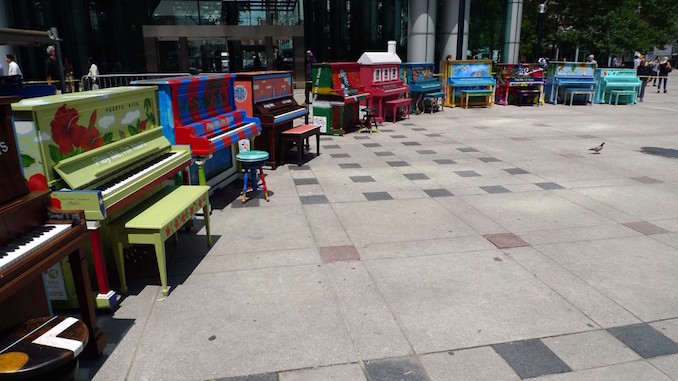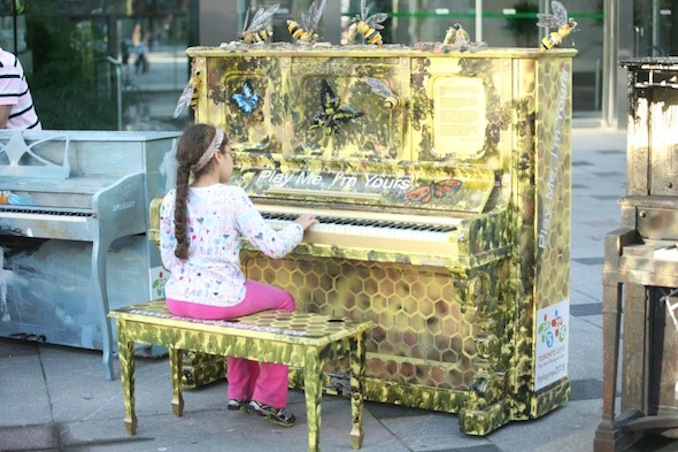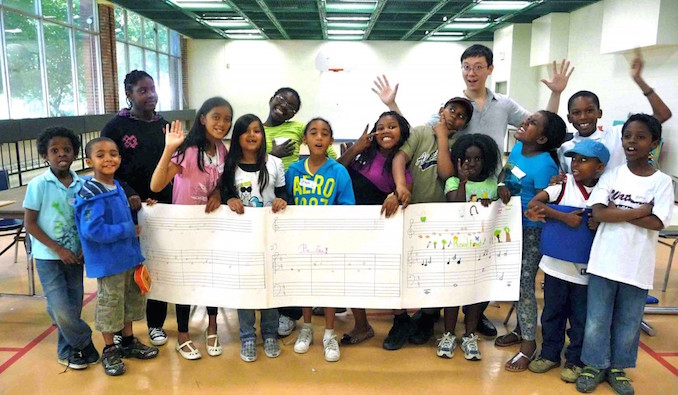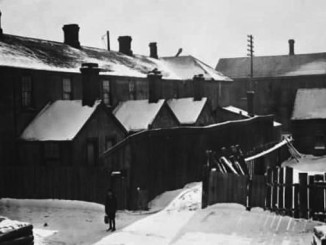Music vs Sports: A Comparative Study of Striving for Excellence and Building Community Spirit

At first glance, Music and Sports seem to have little to do with each other.
Why was it then, that Don Shipley, Creative Director of the 2015 Pan Am Games, chose to mark the three-year countdown with the Play Me I’m Yours Street Pianos Project?
Games such as Pan Am or the Olympics remind us of many things – hope, fear, overcoming adversity – and celebrates the physical and mental superior achievement by mankind. It draws spectators through respect for the relentless discipline and technical precision and the rigorous hours that goes into becoming a top athlete. This training done by athletes is admired at matches and games through which the spectator lives vicariously, sharing in the athlete’s every physical and emotional fight in a race.

Music does this, too, except the training and physical prowess behind becoming a fine artist is not for its own sake, it’s the byproduct of striving for artistic mastery over an instrument and one’s craft.
Music-making also draws spectators, and just like in sports, the higher the caliber of players, the larger the number of spectators (well, usually). And, as much as broadcasters would love for us to believe that athletes are in competition with each other, any interview with a top athlete will indicate that an athlete is primarily in competition with himself/herself. This ‘overcoming one’s own obstacles and challenges’ is clearly embodied in a musical performance- there is no clear competition on stage, and every spectator present becomes part of the singular team sharing the experience of the artist on stage.
This human nature to cheer on another human’s struggle and the celebration of overcoming that struggle, coupled with the community spirit it generates, is what the Play Me I’m Yours pianos were to convey. (I hope I’m not totally going out on a limb here- this is what I’ve gathered from reading interviews with Mr. Shipley, and my few candid conversations with him with my band ‘deVah’ as we prepared for our performance at the unveiling of the pianos at Metro Hall)
The pianos, being familiar yet novel objects, have been acting as a catalyst for conversation, exhibition, and general interaction amongst Torontonians who would otherwise casually walk by each other.
To become a top-notch musician, depending on the instrument, musicians go through at least a good 15 years of specialized training. If your instrument allows it, you may practice up to eight to ten hours a day. (Some instruments don’t lend themselves to this type of rigorous training- reed players can generally do up to maybe three hours a day. If they do any more, the skin on lips will become raw and they risk bleeding)
Many string players and pianists start as young as three (some over-zealous parents will start their kids at two), and train daily for thirteen to fourteen years before gaining entry to a university or conservatory (fancy word for music school), and, just like high-level athletes, will find that there is little for them to do in their trained field once they leave the competitive world.
But what do I think is the most important co-relation between the two?
Both are used effectively to engage youth. I’m sure you already know the benefits of providing organized sports to youth centres, so I won’t bore you with that.
For music, however, take the El Sistema Program of Venezuela for example. Created to keep children and youth from difficult socio-economic backgrounds out of trouble, the program was not only successful in seeing a huge drop in children involved in shady activities, but has created a powerhouse generation of Venezuelan classical musicians who are now establishing their careers in major cities around the world. Even better, they’re now inspiring similar programs around the globe.
Toronto has a few similar programs designed specifically to target children who would otherwise not have access to Classical Music Education.

Axis Music provides tuition-free private and group lessons to children in select Toronto Community Housing, nurturing community bonds through guest workshops.
Euterpe, headed up by Canadian pianist Catherine Wilson, provides high-caliber performances to communities that are often under-served by classical musicians.
University Settlement Music & Arts School. Established in 1921, this program offers heavily subsidized music lessons at a very affordable cost, and is open to everyone.
Viva Arts is a unique program committed to promoting and supporting music and arts education in Canadian Public Schools.
Show your support for our future generation of artists- check out one of these programs and see what is being done for music education in our city!

